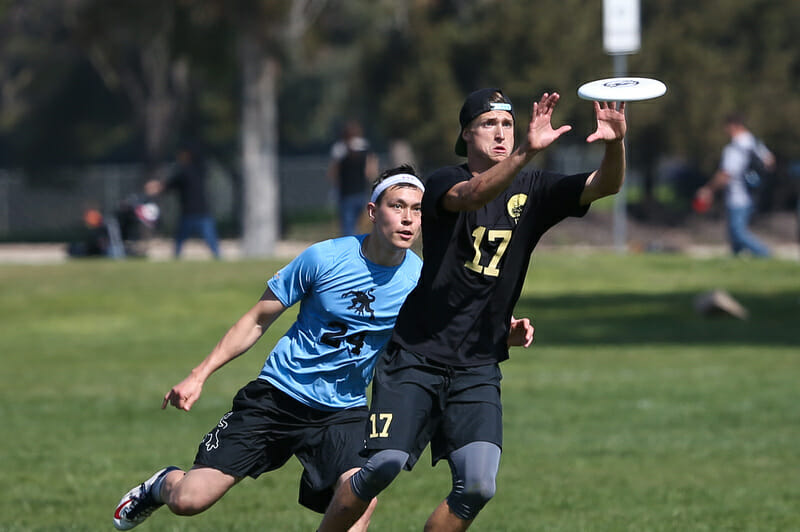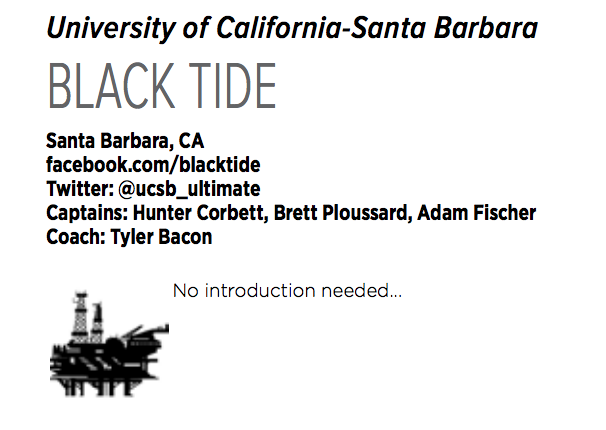UC Santa Barbara Black Tide is back at Nationals with a legacy unlike any team.
May 20, 2015 by Alec Surmani in Preview with 0 comments

It’s been awhile, but somehow it still feels like home.
UC Santa Barbara Black Tide will be returning to the College Championships this weekend for the first time since 2010, when the Southwest still featured juggernaut Colorado Mamabird and USA Ultimate was the Ultimate Players Association. Though they’ve spent the last few years trying to break through and return to their glory days of postseason success, with the kind of history that Black Tide has, that breakthrough rarely ever seems out of reach.
“There is no program with this much success in its past,” said Greg Husak, a former Black Tide mainstay who’s stayed in the Santa Barbara area for years to lead each new generation of youth. “Even if it is the distant past, there is something that can give players who have never been to Nationals confidence. More so than any other school, players who go to Nationals wearing the great blue and gold jerseys know that those jerseys have won Nationals before.
“Just that belief in the back of your mind puts these players in a different state of belief,” Husak said.
RELATED: 15 Years Of Greatness: Greg “Hollywood” Husak Returns To Nationals After Five Year Hiatus
Back in the late ’80s and for most of the ’90s, Black Tide was a wrecking ball. UCSB won three straight national titles from 1988-90. And then again from 1996-98. Think about that.
When even programs like Pitt, that have been training crops of players since they were in middle school, can’t manage to pull out the threepeat, the idea that UCSB managed to do so twice in the same decade is astonishing.
Moreover, in the intervening and surrounding years, Black Tide managed to make it to the semifinals or better eight times between 1986-2001 — not including the years they won it all.
Few, if any, other college programs can boast a similar tradition of repeated success. And how did they reach and maintain that status?
Of course, with any story of success, there are a wealth of factors that play into the final result, but few would likely argue with the assertion that it largely came down to grit.
“Black Tide definitely had intimidation in its favor in the old days, usually worth a few points against all but the top teams,” Husak said. “This was not something that we explicitly worked on, or tried to cultivate, but it was a function of super-intense practices, hyper-competitive characters, great players with big egos, and an extreme ability to leave disputes on the field.”
Steve Dugan, another UCSB alumnus who played with Husak during the glory days of both Black Tide and Santa Barbara Condors, outlined how the old Black Tide practices usually went down.
“We practiced five days a week, three hours per practice. We threw 50-50’s at the start of every practice. Turns had to start over. Each person threw 50 backhands and 50 forehands. Everyone else would wait for the final pair to finish to start the warm-up lap. We’d do a couple drills and play the rest of the time. Sprints at the end.”
As one might expect, any routine that begins by relying on the perfect execution of each member of an entire team — especially when one considers the explosive personalities on a team that expects and demands winning, but also has to train freshmen and other new recruits every year — can lead to some hot tempers.
Husak said practices were known to have the occasional fights, trash talk (even in drills), and sometimes the scolding of teammates for not getting drills right or not being able to properly execute.

Although contemporary ideas about Spirit of the Game (even, or especially, within one’s own team) and team camaraderie might seem incompatible with this seemingly win-at-all-costs mentality, it’s difficult to argue with results, particularly when many alumni from that time period look back so fondly on their time with Black Tide.
Yet, despite this history of aggressive play and mentality, the current incarnation of Black Tide has somehow managed to embody the deeply competitive mindsets of previous generations while having a crop of cooler heads, all without the loss of the fiery passion that’s synonymous with UCSB ultimate.
“The motivation to compete comes from a different place with this current team,” Husak said. “They want it just as much. It just manifests itself differently and is maybe harder to identify in some cases.”
While that passion may indeed not be as overt or abrasive as it was in the past, anybody who has seen UCSB play this year can likely attest to witnessing a team that is no less bent on playing well and winning games.
The New Black Tide
With each tournament, Black Tide has steadily risen and displayed more maturity and cohesion as a team. From losing in quarters at home tournament Santa Barbara Invite to an Arizona State team that looked strong early in the season; to pulling out strong wins over Carleton, Tufts, and Texas at Stanford Invite; to sweeping through Southwest Regionals, UCSB has proven itself to be the strongest program in the region this year and potentially one of the stronger programs in the nation.
According to captain and likely Southwest Player of the Year Hunter Corbett, this can largely be attributed to the team’s mantra: “Black Tide is all that matters.”
“What this means is that it does not matter what team we are playing, we will play Black Tide Ultimate,” Corbett said.
Somewhat similar to their previous incarnations in the ’90s, UCSB has occasionally caught some flak for this approach, albeit for slightly different reasons.
“When teams would try to sing a song or play a game during a timeout, we would turn our back,” Corbett said. “Most people in the ultimate community misinterpret this as ‘unsportsmanlike’ or lacking Spirit of the Game, but this is not true. We are just a hyper-focused team, locked in a certain mindset, ready to take care of business.”
Rather than stepping into a Michael Jordan-like focus on winning like earlier UCSB manifestations, current Black Tide has molded that competitive spirit into a team-first mentality that values unwavering support for and focus on the team and its players.
Furthermore, with local legends like Husak and Dugan often stopping by, as well as other UCSB alumni and current Condors stars like Dan Bellinger and Jeff Silverman also providing guidance and motivation at practices and tournaments, Black Tide has figured out how to allow each new generation to develop their own identity while buttressing each budding crop of new players with legions of support and decades of experience ready to instruct.
“As it is really hard to leave the beautiful town of Santa Barbara, past players maintain an extensive involvement in the team after graduation, probably because Black Tide meant so much to them, which creates continuous support and even some pressure on us,” Corbett said.
Other Santa Barbara benefits include high-level beach pick-up twice a week and weekly scrimmages against the Sundowners, the city’s second club team.
Great Leaders At The Helm
With the leadership that Black Tide has this year, it wouldn’t be too surprising if UCSB managed to break seed this weekend and upset some teams.
Condors and Los Angeles Aviators baller Tyler Bacon has been directing Black Tide since the fall, and the benefits of having their first full-time coach in a while have been paying dividends.
Corbett and Husak both said that Bacon developed a focused plan for development in October and has guided the team in the right direction from the onset, always intent on progressing and refining the system.
“The players definitely stepped up and earned everything they have achieved, but he gave them the tools and structure to develop and gave the players roles and responsibilities to get them progressing their careers,” Husak said.
Corbett said this plan for steady progression could be seen in how the team played mostly even lines all year, so that the bottom half of their roster could gain confidence they could rely on in the postseason.
“Even in finals of Regionals, we did not shorten the lines much. I maybe played two or three D points against Stanford,” Corbett said. “This takes a lot of pressure off the O and the older players with rookies throwing hucks and saving our legs. “
With such a steady rockbed of tradition and guidance from alumni, along with the current leadership’s focus on building a full team of contributors that prize team-togetherness above all else, Black Tide will surely come into Nationals this weekend with their own signature brand of swagger, ready to take it to opponents every round.
Corbett summarized his team’s mentality going into the tournament, which perhaps functions as a great amalgam of both the new and old mindset of Black Tide: “We had been the favorite all through Sectionals and Regionals, but now we are a dark horse with one focus in mind: ending other teams’ seasons.”